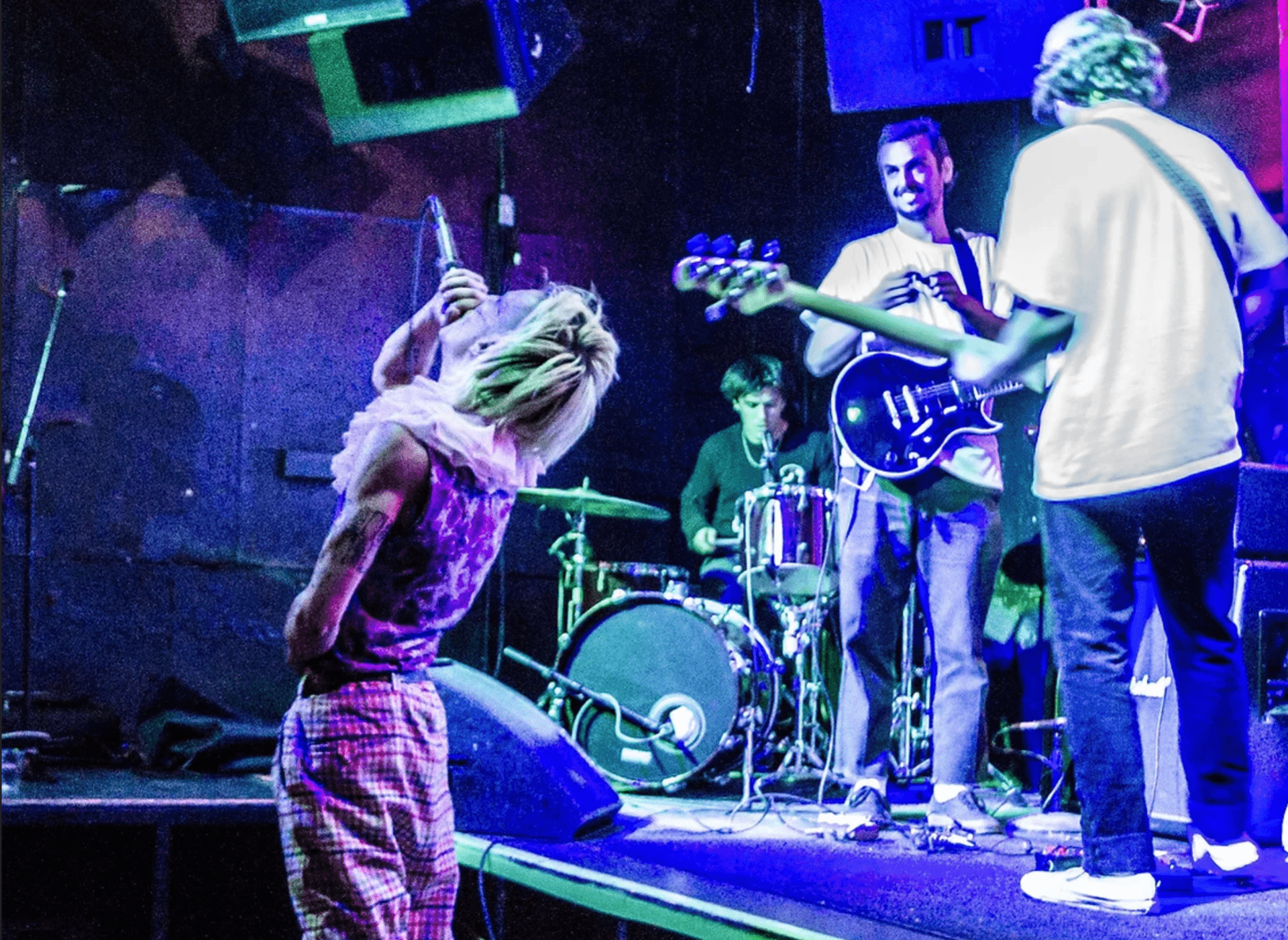Vlana Aarons entered Outside Lands 2021, an annual music and arts festival located in Golden Gate Park, expecting there to be significant health precautions in place due to the ongoing threat posed by the COVID-19 virus. She was shocked to find that security was not paying much attention to enforcing the Center for Disease Control’s COVID-19 guidelines.
“There was little to no security or safety when entering events. Security guards did little to maintain social distance as well as control the crowds. Everything was very lenient as if nothing was going on,” Aarons said.

Outside Lands 2021 attendees take photos and chat with friends in front of the classic festival archway, which was decorated with spiders and cobwebs, in Golden Gate Park on Oct. 30. The annual music festival was canceled in 2020 due to COVID-19. Traditionally held in the summer, the dates were pushed to Oct. 29-31, 2021. Reflecting its spooky resurrection during the Halloween weekend, many attendees dressed up in costumes, and Halloween decorations could be seen around the park. However, the only masks in sight were for costumes, not protection.
The return to old ways of life prior to the pandemic is rapidly becoming a reality. Based on the experience of several visitors and staff members at Outside Lands, people have become less cautious about COVID-19. According to Outside Lands’ health and safety requirements, all attendees were required to “Provide proof that you are fully vaccinated against COVID-19 (you must receive your final vaccine dose 14 days prior to your entry date)” or “provide proof of a negative COVID-19 test within 72 hours of attending the festival.” Outside Lands also highly encouraged attendees to wear a mask regardless of vaccination status and when social distancing was not possible.
However, masks to protect against COVID-19 were a rare sight in the park. Josh Cain, Aarons’ boyfriend, expressed concern over the seeming lack of care toward safety guidelines. “In addition to Outside Lands security’s carelessness of enforcing COVID-19 safety guidelines, there was just a lack of security in general,” Cain said.
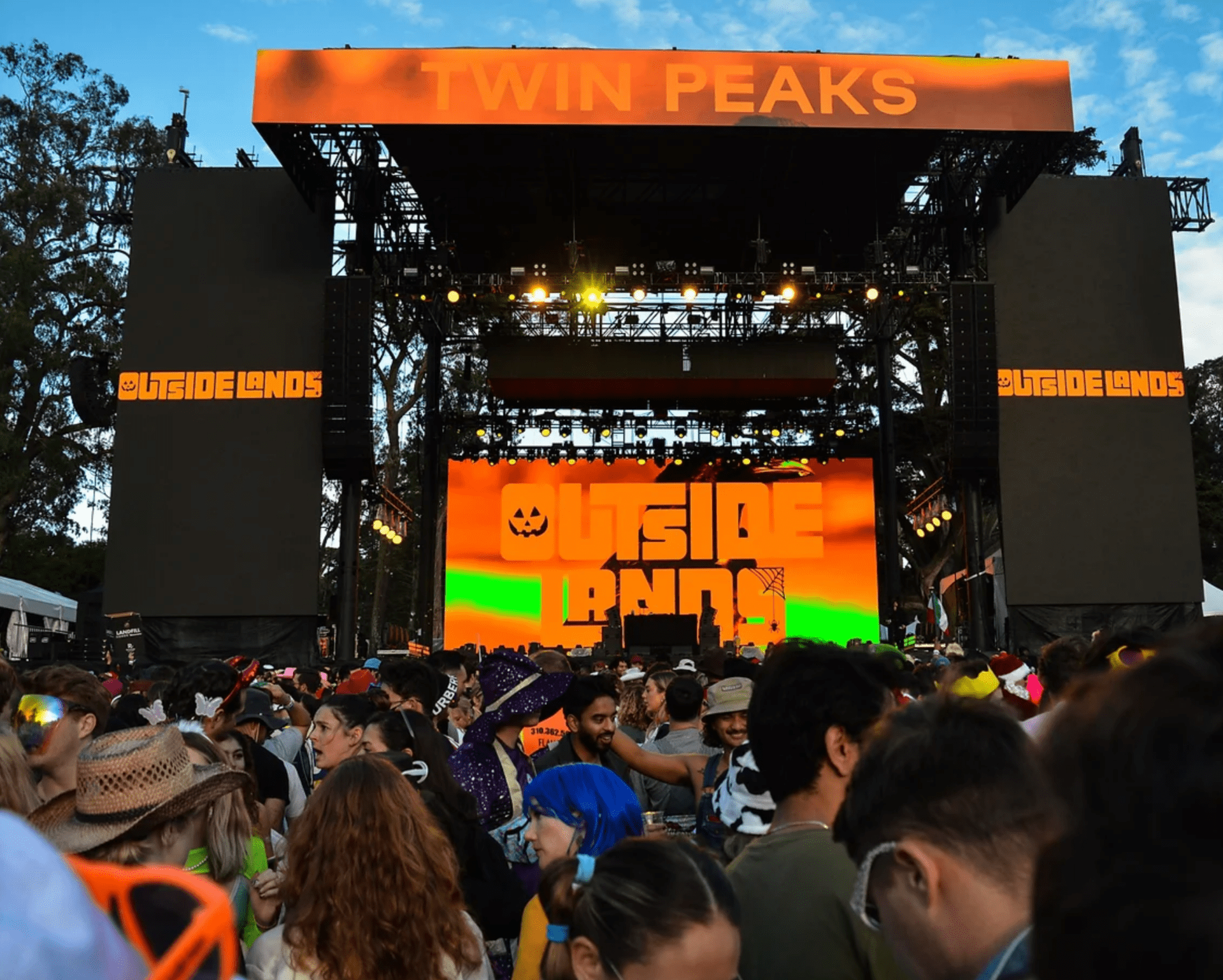
Attendees at Outside Lands closely pack the space around the “Twin Peaks” stage in Golden Gate Park on Oct. 31.
Brittany Hale, another Outside Lands attendee, said security did not check any of her bags. “We were able to bring in alcohol and weed with no problem. They had a metal detector and only checked bags if the detector got set off,” Hale said.
It seems contradictory to have an extensive list of safety regulations listed on the Outside Lands website, yet leave them inadequately enforced. It appears as if Outside Lands only posted those rules to avoid facing legal liability regarding COVID-19 safety, and not out of courtesy for the attendees.
People were also able to sneak into the park during the festival. Festival-goer Darina Davis shared that she bribed a security guard to let her in, paying $140 for herself and a friend to enter without tickets on Sunday. Another of Davis’s friends paid a security guard $40 to get in on Saturday. Davis said, “I think it’s because there were so many entrances and [the] security [guards] were volunteers, and this is the first big event in two years so security wasn’t hella strict.”
In addition to the array of stages scattered around Golden Gate Park, booths with local vendors selling food and drinks lined the grassy arenas. Most of the people behind the counter were there for the money, as well as free access to the festival. Although they came face to face with a plethora of strangers, increasing their risk of contracting COVID-19, many vendors agreed that it was worth it.
Jaylen Li, a booth-worker for Palmetto Superfoods, said, “I do worry about being exposed to COVID-19, but I thought it would be worth it because I’ve never gotten to see such big artists before.” Li explained that it was rare for artists to perform in Hawaii, her home state, because the fan base on the islands is not large enough for artists to make the trip.
Vendors like Li put a lot of faith in their customers to take necessary safety precautions. Li said that their booth followed COVID-19 guidelines by “wearing gloves the whole time and switching gloves if we touched anything like our hair or eating food.” Although workers tried their best to handle food as safely as possible, they explained that customers often did not follow the festival’s rules around COVID-19. Li said she “personally thought those unsafe customers were gross and selfish,” but didn’t express her disappointment to them..
Unlike festival staff, performers at Outside Lands did not make many remarks about COVID-19. That is, except for the front man of the Strokes, Julian Casablancas, who made fun of San Francisco’s COVID-19 protocols in part by telling a story about getting barred from entering a restaurant for not being fully vaccinated. By contrast, rather than forego the thrill of crowd surfing, Goth Babe’s front man Griff Washburn dressed himself in a full hazmat suit before jumping into the sea of people below him.
Other performers, such as up and coming bedroom-pop artist CLAUD, were just happy to be there, despite any nerves due to the pandemic. “I feel really good about it,” they said about their performance. “I did a bunch of festivals in the last month or so. But before a few weeks ago, I’d never played a festival. But every time it’s like, yeah, it’s really cool. It’s really fun and scary.”
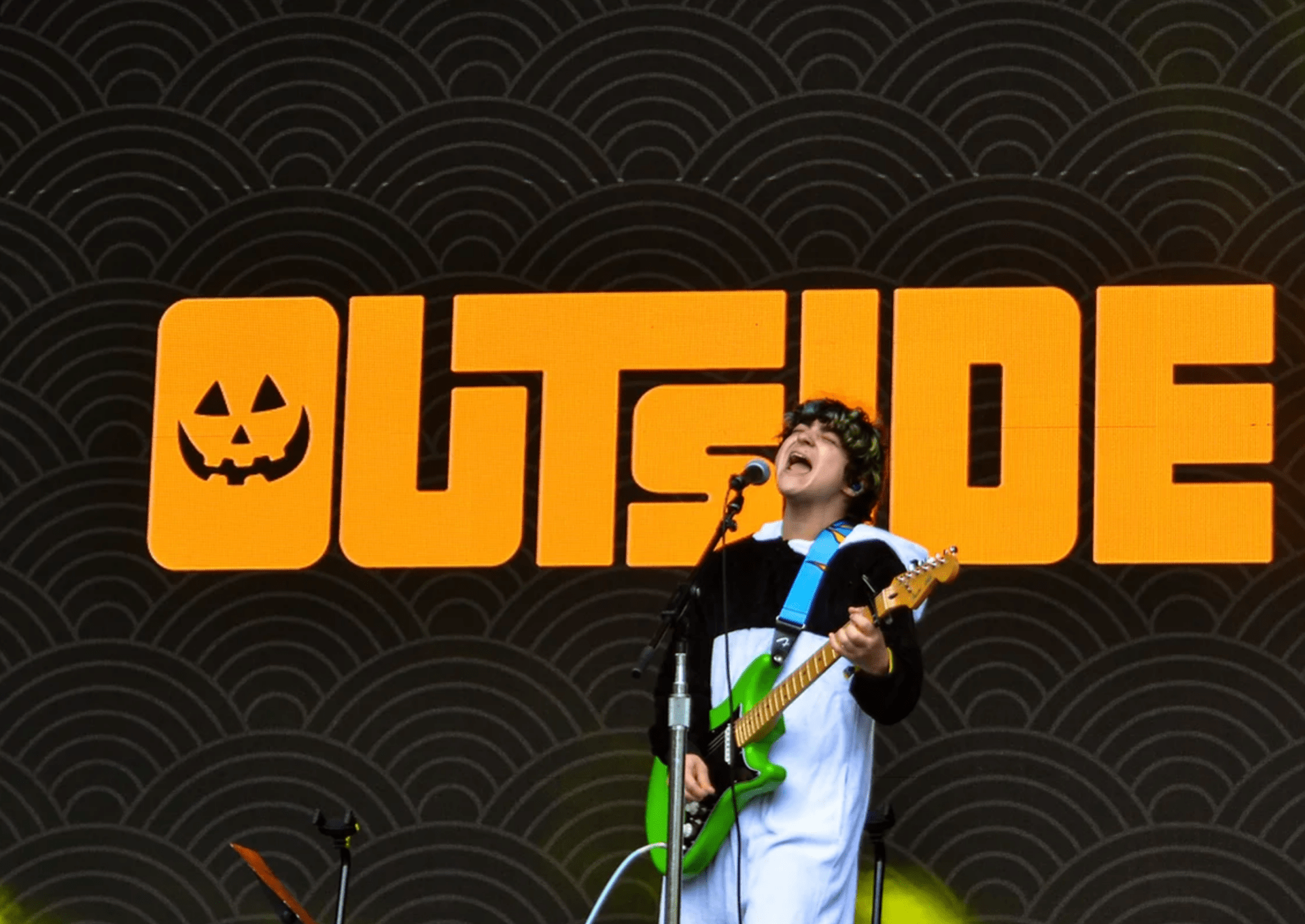
CLAUD, a bedroom-pop artist from the suburbs of Chicago, performs their popular song “Wish You Were Gay” in front of a festive backdrop at Outside Lands in Golden Gate Park on Oct. 31, 2021.
Concerns around the pandemic and safety guidelines understandably vary between performers. But many seemed more than ready to rejoin the live music scene. Jhon Solis, for example, is a performer and University of San Francisco (USF) student, who enjoys playing the guitar for his friends and has built a fan base by posting his cover versions of songs on YouTube, Instagram, and Facebook.
After COVID-19 hit, Solis, like most musicians, found his ability to play live limited by public health concerns, and resorted to releasing only pre-recorded videos played over Zoom or YouTube Live. When USF returned to in-person instruction in the fall of 2021, Solis was able to perform in the university’s Kasamahan talent show. “It was fun to perform for everyone online but nothing beats playing in person,” Solis said. “Not only is it way more enjoyable to play live, but nothing beats crowd interaction.”
Solis said that he can’t speak for all the different artists and performers, but that, “it was difficult to perform during COVID-19.” He continued, “In general, what hurts most bands and performers is the lack of audience interaction, as that’s what fuels your excitement and motivation while playing.” Solis said that this is why he was not hesitant to perform in front of an audience, even though COVID-19 was still spreading. “Hearing everyone scream and sing the song you’re playing while also seeing them dance, is something I would take any day over an online performance.”
Solis’s experience as a musician during the pandemic matches that of other Bay Area artists, such as the members of local punk bands who began performing once again in the wake of loosening COVID-19 restrictions and the reopening of local venues. These performers also had to find ways to adapt to the new circumstances they found themselves in during lock down.

Dead End Job, a punk band from Berkeley, performs their new single, “By Your Side,” at the Golden Bull in Oakland, CA, on Oct. 17, 2021. Colin, the lead vocalist and guitarist, said the band wrote the song in the midst of the COVID-19 pandemic but could not perform it live due to Bay Area music venues being shut down. “This is only the third time we’ve played this song live, so I want to see some moshing for this one,” Collin said.
Failsafe, a punk band from San Francisco, had just recently begun playing indoor shows again when they rocked the Golden Bull in Oakland on Oct. 17, 2021. Kyle Dewitt, the lead vocalist and guitarist, said that writing and recording new music during the COVID-19 pandemic, as well as playing outdoor “DIY” shows with other Bay Area bands, gave the band back some of the drive they had lost when venues closed. “We’ve been incredibly humbled to witness the fan base we built from our outdoor shows pack the house at some of our favorite venues now that they’re back open,” Dewitt said.
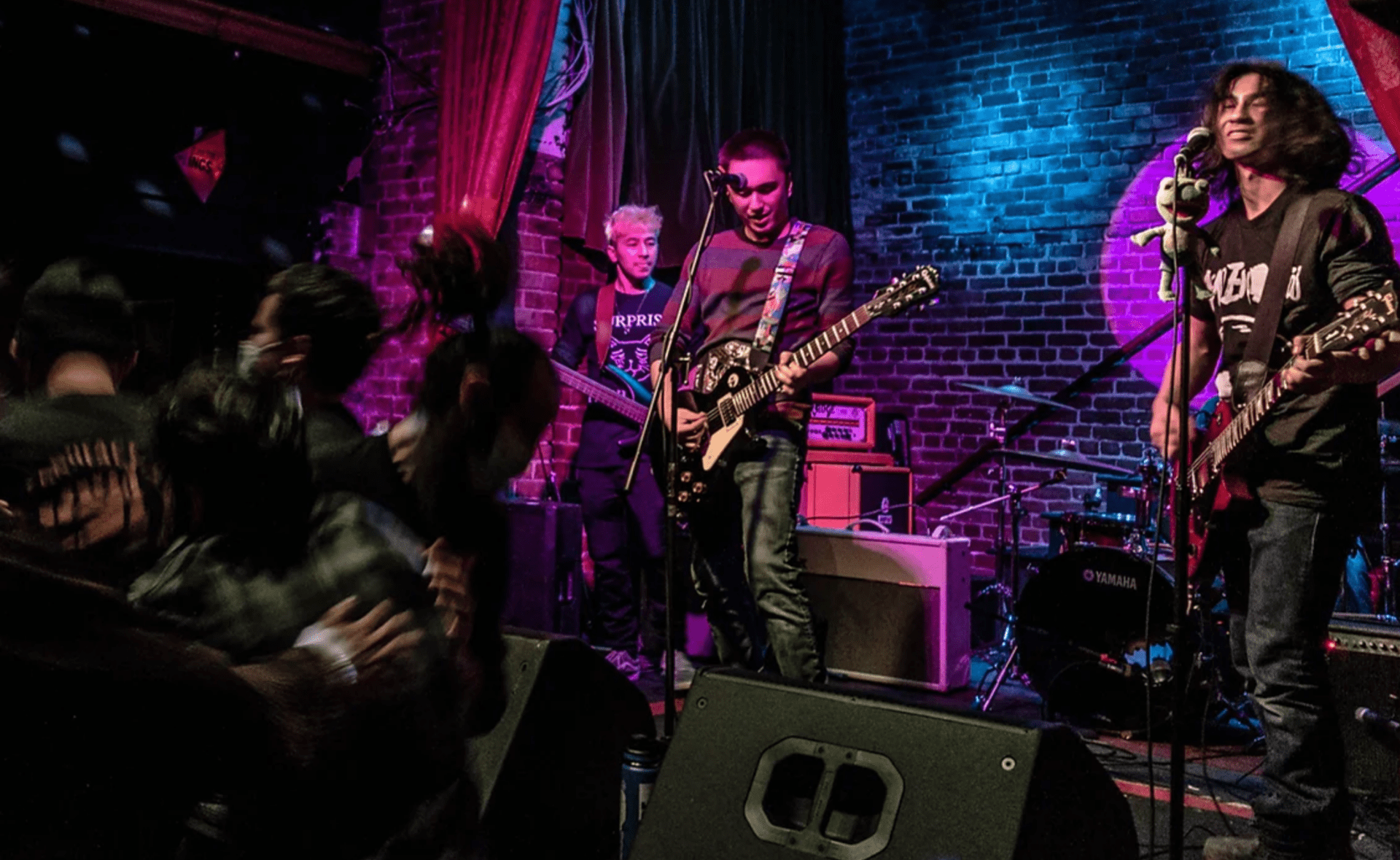
Failsafe performs as the mask-sporting crowd moshes — a form of dancing characterized by high levels of aggression and physical contact — in front of the stage at the Golden Bull in Oakland, CA, on Oct. 17, 2021.
Having to resort to online performances and live streams was difficult for many artists, so finally being able to perform in-person once again prompted much enthusiasm. Solis said, “It’s super easy to set up a livestream or premiere, but it’s a whole other game preparing for a live performance as there are so many variables to consider. Having been in COVID for so long, it felt nice having a sense of normalcy despite the masks.”
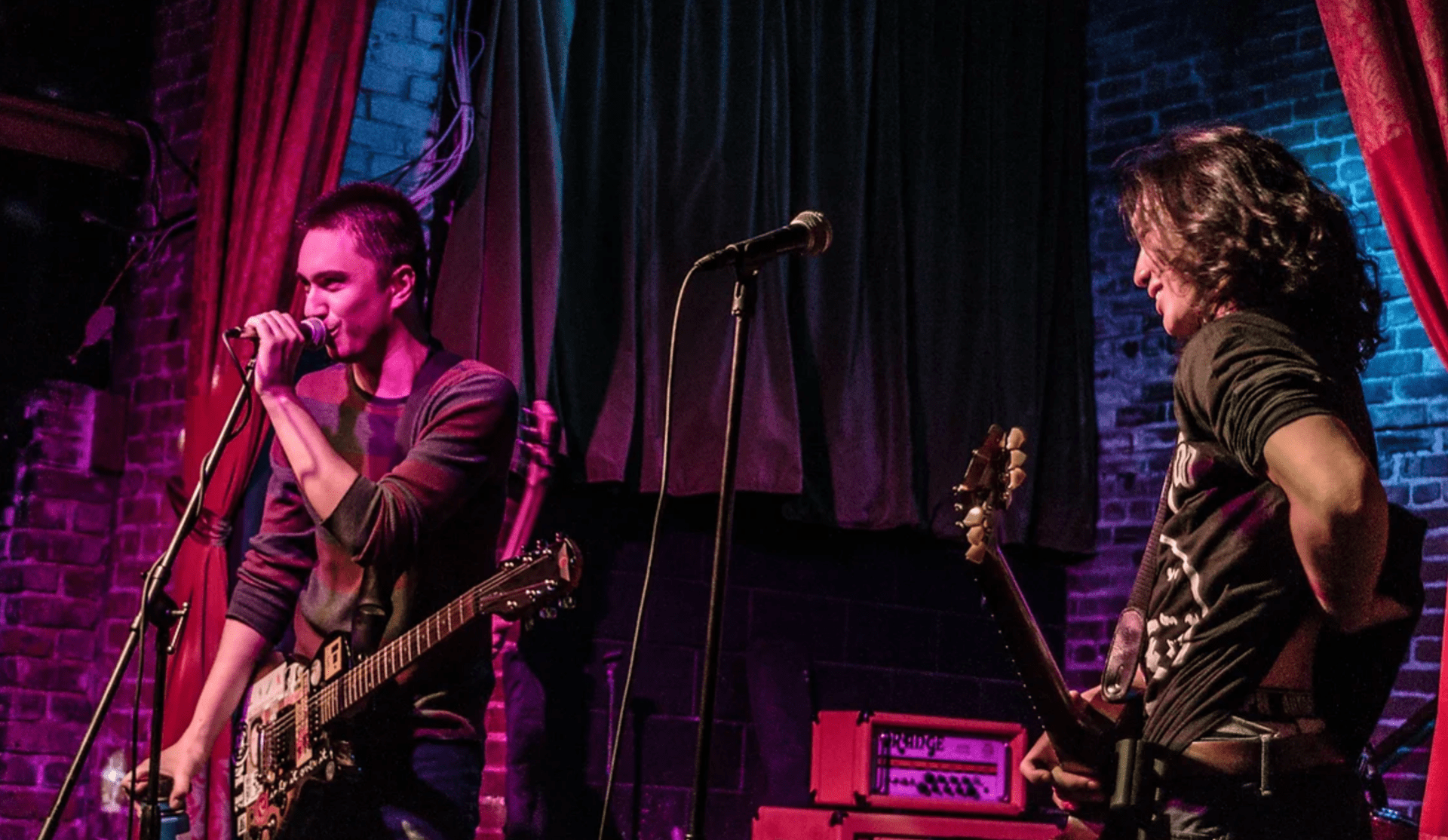
Failsafe performs at the Golden Bull in Oakland, CA, on Oct. 17, 2021. The members of Failsafe all agreed it felt good to be back on a real stage.
Other artists, like Failsafe, however, did not stick to the screen when venues closed, and found inventive ways to keep performing live, or took the time away from the stage to focus on creating new music. The members of Surprise Privilege, a punk band from San Francisco, founded “Sh*tshow in the Park,” an ongoing series of outdoor punk shows often held in Golden Gate Park that arose in reaction to venues closing in 2020. The shows give the band and their friends a way to stay connected during lock down, and a reason to make new music. As long as they do not attract attention from police, they are able to perform freely for their loyal fans, who are happy to support them from either the hardwood floors of the pit, or from the park ground in front of a makeshift, outdoor PA system.
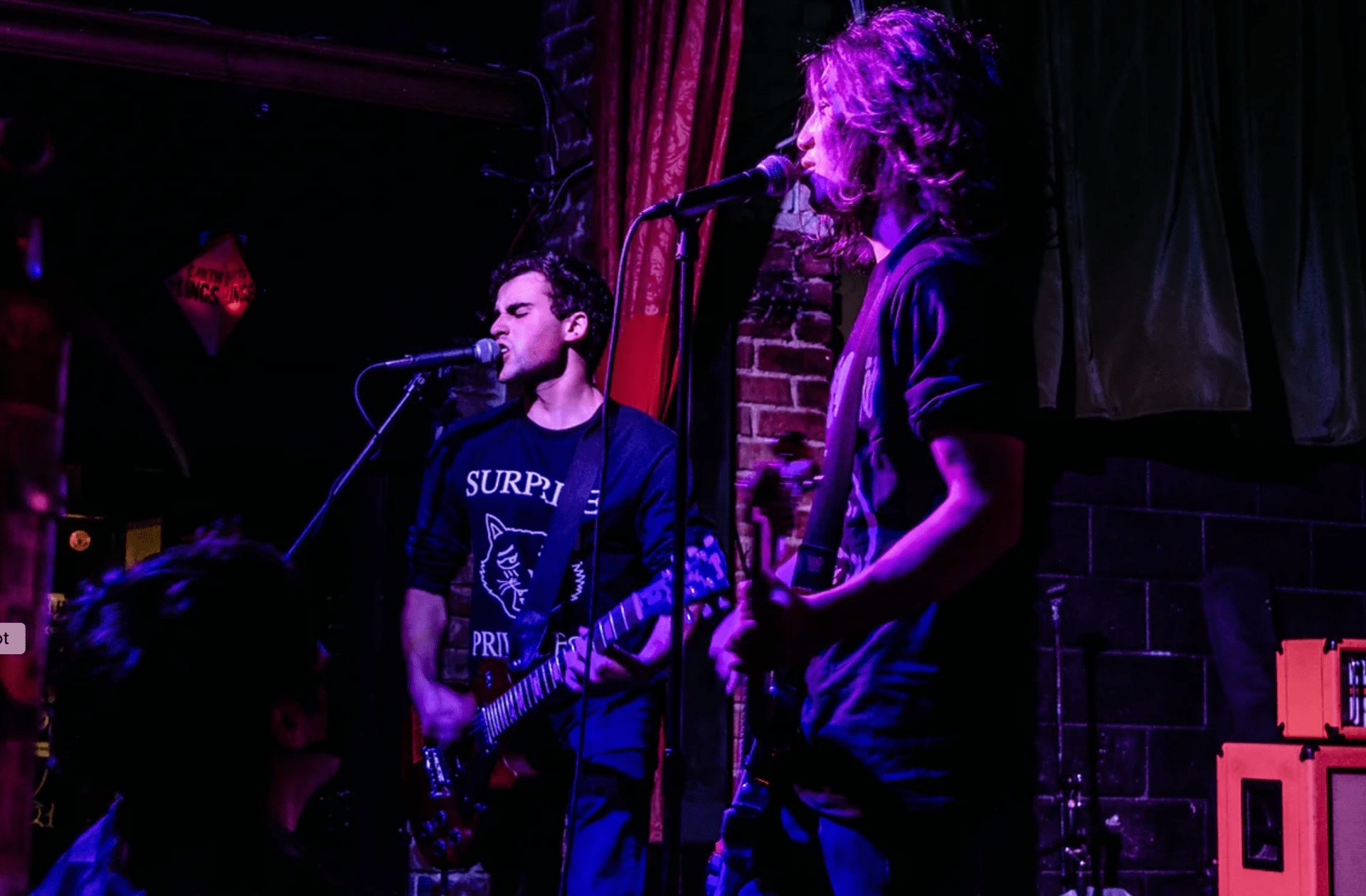
Surprise Privilege performs at the Golden Bull in Oakland, CA, on Oct. 17, 2021.
The pandemic also provided opportunities and time for younger bands to get their footing before beginning to play live shows. ROH and Leer, two bands based in San Francisco, have emerged from lock down with the sounds and fervor to define their newly formed collectives. Rohan Kapur, ROH’s front man, said at one of the band’s first live performances that ROH had then only existed for a few months, but he had been working on their material for a couple of years. “I love performing, so COVID was a bummer in that sense, but I took the year to record a ton and get a better sense of what the band and sound really is,” Kapur said. “I came out of lock down with 15 originals, so if anything it’s just more songs to work with now that we’re back to playing shows.”
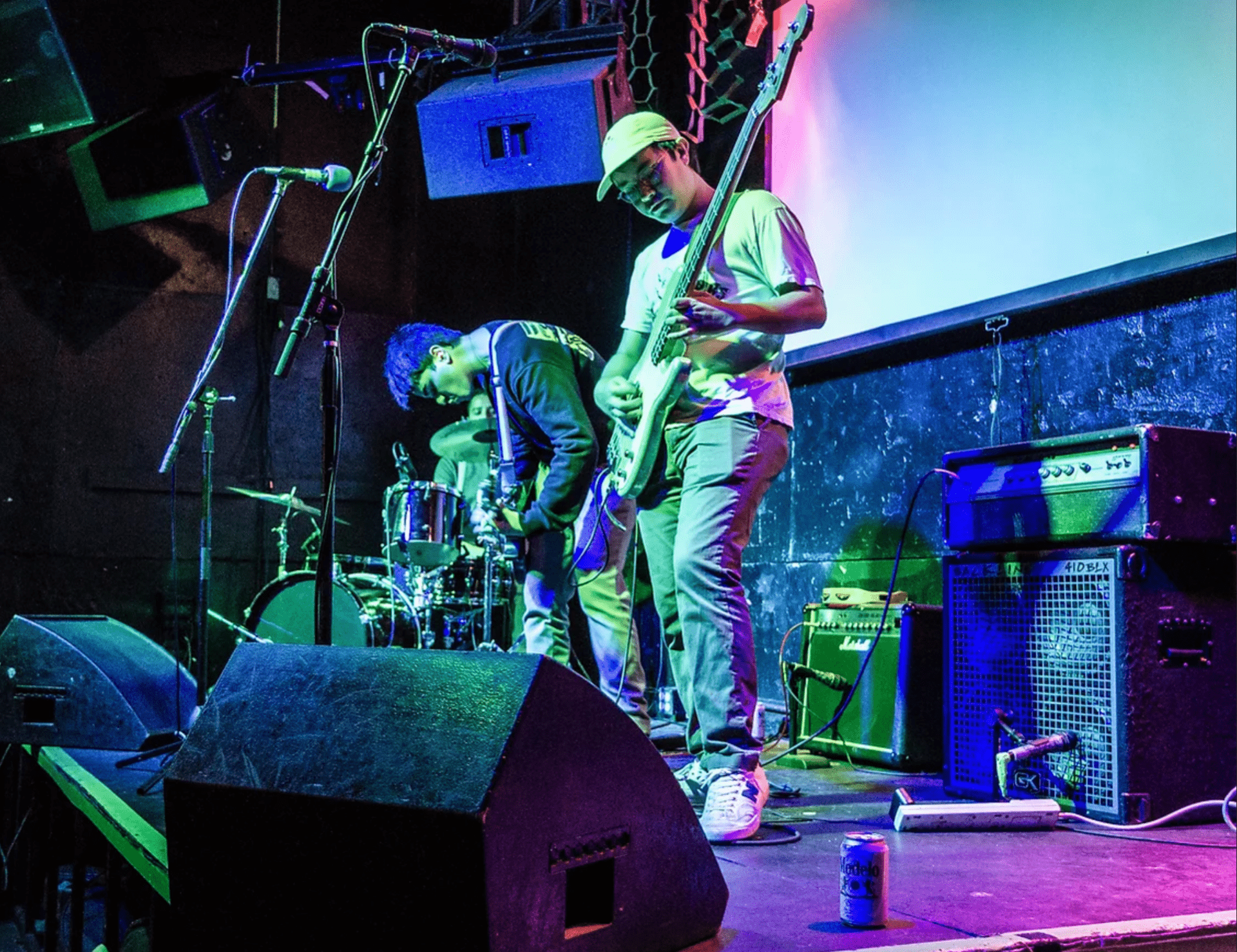
ROH, a surf-punk band based in San Francisco, performs at the Milk Bar in San Francisco, CA, on Oct. 15, 2021.
Despite the few positives that arose for musicians during the pandemic, and the return of live shows in the fall of 2021, performers and audiences alike have still not fully let their guard down when it comes to the virus. Aarons, in reference to attending live concerts, said, “Although everyone is vaccinated, I found that after these events, I get sick and even after getting tested, realized there’s much more than COVID-19 going around and because I haven’t been out in so long, my immune system is more prone to this.” However, Aarons said she understood that live performances are one of the main sources of income for musicians and producers, and that ultimately it is the decision of the attendees to go at their own risk.
Li said, “Obviously with COVID-19 still around, huge concerts should not be done. However, producers want to make money and consumers like me are willing to pay, since there has been nothing going on for the past year.” Based on sold out events like Outside Lands, this attitude reinforces the assumption that attendees definitely felt like it was the right time for live events to come back.

Tyler, The Creator, a rapper from California, performs in the pit in front of the crowd as attendees look on at Outside Lands in Golden Gate Park on Oct. 29, 2021. His performance was one that was long-awaited by festival ticket-holders after its initial cancellation.
Similar to Aarons, Hale said that “since many people are vaccinated now, it is a good time to bring back music festivals,” but she emphasized that live music events should not be as large and un-monitored as Outside Lands 2021. She said that in large gatherings, some people are bound to be sneaky and forge their vaccine cards, which made her very nervous.
Upon attending live music events, people still risk being exposed to COVID-19. In spite of this, many Outside Lands attendees said it was worth the gamble because of the joy they experienced seeing live music again.
Hale, like many of the young fans of live music, said she feels like she’s missed out on a lot of the fun aspects of the typical college experience during the pandemic. “Maybe it’s selfish, but I had two jobs and was really safe throughout the whole pandemic,” Hale said. “So I was like: Fuck it. I deserve to go to Outside Lands. I had a ton of fun and didn’t get COVID-19.”
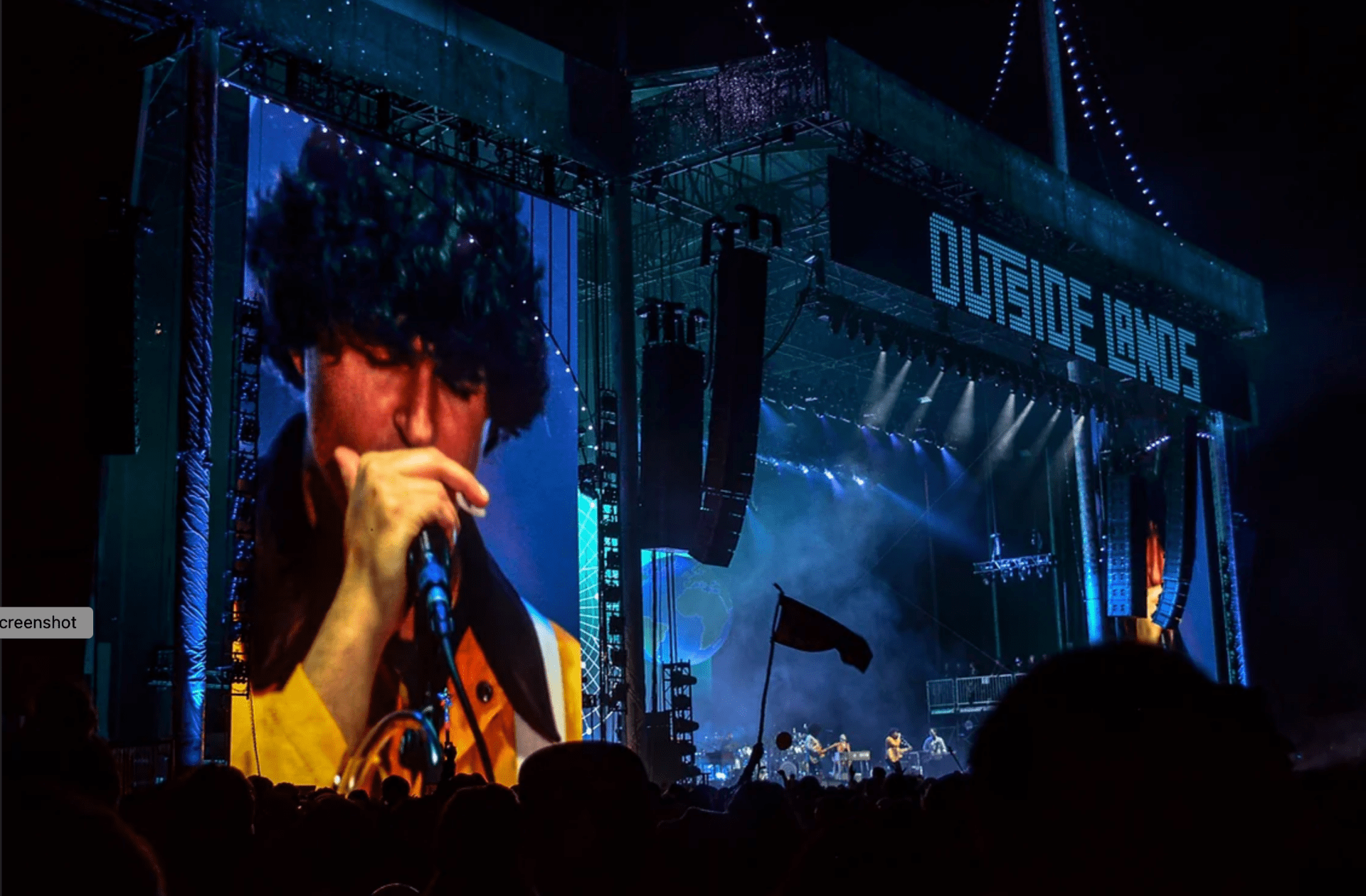
Vampire Weekend, a rock band from New York City that was scheduled to play at OSL before its original cancellation, performs in front of an energetic audience, as lead vocalist and guitarist Ezra Koenig is projected onto the large screens at the front of the stage on Oct. 30, 2021. The band finally got the chance to light up the Outside Lands stage for their first show in 18 months, and their only show of 2021.
Whether they enjoy moshing to the sound of punk bands, or screaming at the sight of a beloved musician in the flesh, or just meeting other people who share their musical taste, fans of all types are celebrating the revitalization of live music. Similarly, artists are once again taking the stage and reconnecting with their fans.
As we emerge from the last two years of the pandemic, we can once again experience the joys that were temporarily lost to COVID-19. However, we are not out of the woods yet. The risks of the virus remain an all-too-present reality, and we must be conscious of that while we return to the ways of life we knew prior to the pandemic.
Article by Michelle Fong
Photos and Captions by Callie Fausey
Editor’s Note: The reporters used pseudonyms for this story to protect the privacy of their subjects.
